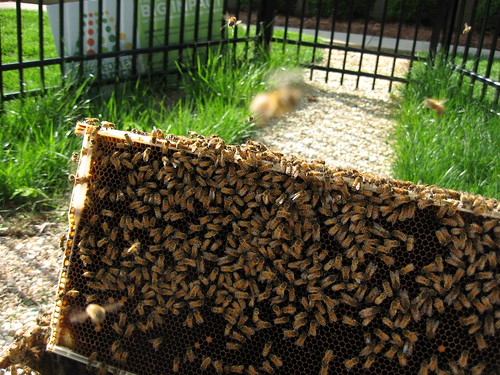
In agriculture, buzzing can be music to our ears—especially if that buzz means pollinators are busy helping produce our fruits, nuts, vegetables and field crops. Unfortunately, the sound of my favorite pollinator, the honey bee, has grown fainter in recent years due to higher rates of over-winter colony loss. These losses were initially attributed to a condition described as Colony Collapse Disorder (CCD).
Many factors involved with CCD are not yet fully understood. Honey bee research is focused on gathering data from multiple angles to increase the understanding of overall honey bee health. Many USDA agencies and industry partners are conducting research to better understand the complexities of honey bee health and working to develop best practices to improve the honey bee population.
Since 2007 the National Science Laboratories (NSL), a part of the Agricultural Marketing Service (AMS), has provided pesticide residue testing services to honey bee stakeholders, supporting research into the causes of CCD and other related honey bee health issues. As part of the long-term efforts focusing on the causes of honey bee decline, we test a broad range of pesticide residues in honey bee products—including pollen, beeswax, honey, nectar, royal jelly and the bees themselves.
In exploring possible factors, researchers studying honey bee issues have discovered many sub-lethal effects of pesticide residues, but no single pesticide has been identified as a direct cause of CCD. It is possible that pesticide residue exposure may play an indirect role in honey bee health, which is why it continues to be an important aspect being studied.
Our work is helping researchers and beekeepers better understand the effects of pesticide residue exposure on honey bees. Our scientists also work closely with Federal and State government agencies, academic institutions, industry corporations, beekeepers and honey bee advocates. With a reputation for quality pesticide residue analysis, we have provided apiculture—or beekeeping—sample testing for more than 60 stakeholders.
Located in Gastonia, NC, our lab is a user-fee supported facility. We offer chemical, microbiological, and bio-molecular testing services for on a wide variety of agricultural products including bee keepers wanting hive products tested for pesticide residues.
By providing high-quality pesticide residue results, the NSL is helping to keep that beautiful buzz going in the pollinator field.
